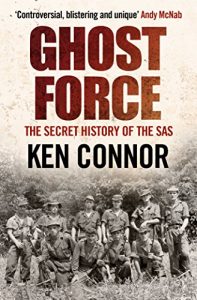Formed in 1941, David Stirling’s SAS had been a highly mobile yet conventional force.
The modern SAS can be traced more directly to the Chindits and Force 136.
Between the onset of peace and persistent opposition in certain circles, in the autumn of 1945 the original SAS was disbanded.
Less than two years later the Malayan Emergency exposed how unprepared the British Army was not only for jungle warfare, but for unconventional warfare in general.
It was a niche that needed filling, and so Mike Calvert – the man who had been forced to preside over the disbandment – was able to breathe life into the Regiment once more.
Able to adapt, improvise and refine their techniques to face the most hostile of environments, the SAS forged a reputation as the world’s premier special forces unit.
In order to fully appreciate the importance of the SAS and its contribution from 1947 to the Gulf War, Ken Connor places the Regiment’s history within the wider, political context.
Compiled from personal experience and the eye-witness accounts, Connor reveals SAS involvement in the Falklands War and the Gulf War and their operations against the IRA in Gibraltar.
First published in 1998, ‘Ghost Force’ remains both thrilling and eye-opening, including a fascinating insight into how Connor felt the SAS should adapt for the twenty-first century.
This is the definitive history of the Regiment written by an ex-SAS soldier of 23 years' experience.
Praise for Ghost Force
“Controversial, blistering and unique” — Andy McNab
Ken Connor served in the Special Air Service from 1963 to 1986, seeing active service in four theatres of war. Closely involved in VIP protection techniques and the establishment of the Counter Revolutionary Warfare team, he became a Senior Instructor in a number of specialised areas and also trained US personnel at Quantico.
The modern SAS can be traced more directly to the Chindits and Force 136.
Between the onset of peace and persistent opposition in certain circles, in the autumn of 1945 the original SAS was disbanded.
Less than two years later the Malayan Emergency exposed how unprepared the British Army was not only for jungle warfare, but for unconventional warfare in general.
It was a niche that needed filling, and so Mike Calvert – the man who had been forced to preside over the disbandment – was able to breathe life into the Regiment once more.
Able to adapt, improvise and refine their techniques to face the most hostile of environments, the SAS forged a reputation as the world’s premier special forces unit.
In order to fully appreciate the importance of the SAS and its contribution from 1947 to the Gulf War, Ken Connor places the Regiment’s history within the wider, political context.
Compiled from personal experience and the eye-witness accounts, Connor reveals SAS involvement in the Falklands War and the Gulf War and their operations against the IRA in Gibraltar.
First published in 1998, ‘Ghost Force’ remains both thrilling and eye-opening, including a fascinating insight into how Connor felt the SAS should adapt for the twenty-first century.
This is the definitive history of the Regiment written by an ex-SAS soldier of 23 years' experience.
Praise for Ghost Force
“Controversial, blistering and unique” — Andy McNab
Ken Connor served in the Special Air Service from 1963 to 1986, seeing active service in four theatres of war. Closely involved in VIP protection techniques and the establishment of the Counter Revolutionary Warfare team, he became a Senior Instructor in a number of specialised areas and also trained US personnel at Quantico.






